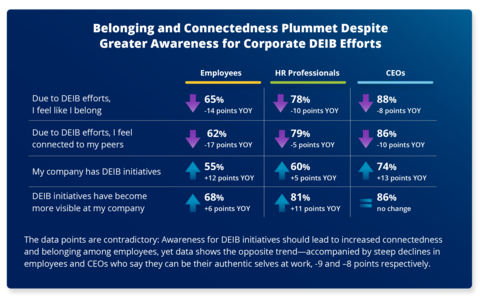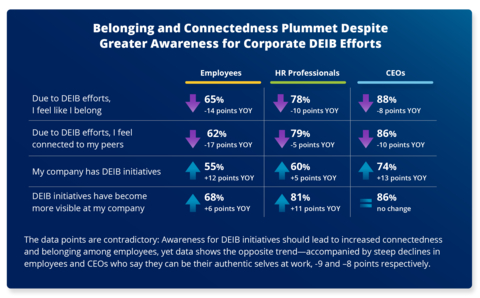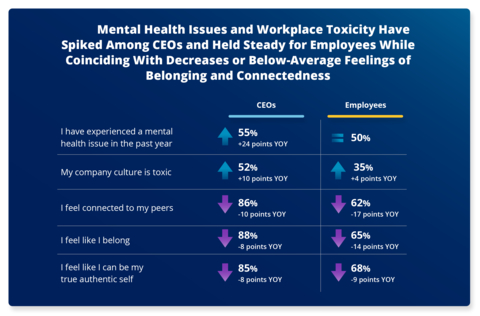DENVER--(BUSINESS WIRE)--Businessolver®, a leader in benefits and HR technology solutions, released its 2024 State of Workplace Empathy DEI report, offering an evidence-based look at the impact of corporate diversity, equity, inclusion, and belonging (DEIB) efforts. The report is based on findings from their ninth annual 2024 State of Workplace Empathy Study.
This year’s study revealed double-digit declines in feelings of belonging and connectedness among the national survey of 3,100 employees, HR professionals, and CEOs—despite indications that corporate DEIB initiatives are largely becoming more visible.
“We’re seeing significant declines in feelings of belonging and connectedness among employees and CEOs, with notable disparities across generations and industry verticals. Yet despite these declines, awareness for corporate DEIB efforts increased year-over-year (YOY). This is particularly interesting given the current climate of DEIB de-prioritization,” said Rae Shanahan, workplace empathy advocate and Chief Strategy Officer for Businessolver. “While divestment is gaining headlines, our data paints a different story of increased awareness and credit given to leaders and organizations for their DEIB efforts. Even so, employees and leaders alike feel their companies should be doing more.”
Stark declines in feelings of belonging and connectedness among employees and CEOs
Only 65% of employees (-14 points YOY) say they feel like they belong at their workplace due to DEIB efforts. CEOs and HR professionals also saw declines in belonging, -8 and -10 points YOY respectively. Numbers are even lower for connectedness with 62% of employees (-17% YOY) saying they feel connected to peers. CEOs and HR professionals likewise experienced declines in connectedness, -10 points and -5 points respectively.
In stark contrast to falling perceptions of connectedness and belonging, the number of employees who said their company has DEIB initiatives in place rose 12 points YOY to just over half of respondents, from 43% in 2023 to 55% in 2024. Likewise, the number of employees who said DEIB efforts had become more visible within their company rose from 62% in 2023 to 68% in 2024. Immediate supervisors’ influence on DEIB effectiveness also showed an upward trajectory, with a 10-point YOY increase in the percentage of employees who agree that DEIB initiatives are very important to their manager.
Declines in connectedness and belonging coincide with rising mental health issues and workplace toxicity
The double-digit declines in connectedness and belonging observed in the report coincide with a marked rise in mental health issues and perceived workplace toxicity: 50% of employees cite a mental health issue in the past year and 35% of employees say their company culture is toxic. These sentiments permeate all levels of organizations. CEOs index even higher with half (50%) agreeing their company culture is toxic.
"The data shows quite clearly that now is the time to invest in people," said Lisa Alvarado, Managing Director at Holistic, a DEIB and People Experience consultancy. "It is crucial for leaders to craft intentional strategies that ensure DEIB effectiveness and cultivate employee engagement, professional development, and optimism in the workplace. Measurable and demonstrable success is more important than ever, and we are pleased to bring key strategies forward in Businessolver's latest report."
To read the full 2024 State of DEIB report and access other reports from the 2024 State of Workplace Empathy Study, visit www.businessolver.com/empathy.
About Businessolver’s Annual State of Workplace Empathy Study
Since 2016, Businessolver has surveyed a diverse cross-section of more than 20,000 employees, HR professionals, and CEOs across six industries to examine the behaviors and benefits that make a workplace empathetic. In the survey, empathy is defined as “the ability to understand and/or experience the feelings or perspectives of another.” In March 2024, a third-party firm fielded the online survey for the 2024 study among employees, HR professionals, and CEOs within financial services, government, healthcare, hospitality, manufacturing, and technology sectors. To qualify for the survey, respondents needed to be 18 years or older, U.S. residents, employed full-time or part-time within their respective industry at an organization with 100 or more employees. Learn more and find historical trend data from 2016 to today at businessolver.com/empathy.
About Businessolver
Since 1998, Businessolver has delivered market-changing benefits technology that empowers empathetic service supported by an intrinsic responsiveness to client needs. The company creates client programs that maximize benefits program investment, minimize risk exposure, and engage employees with easy-to-use solutions and communication tools to assist them in making wise and cost-efficient benefits selections. Founded by HR professionals, Businessolver’s unwavering service-oriented culture and secure SaaS platform provide measurable success in its mission to provide complete client delight.





